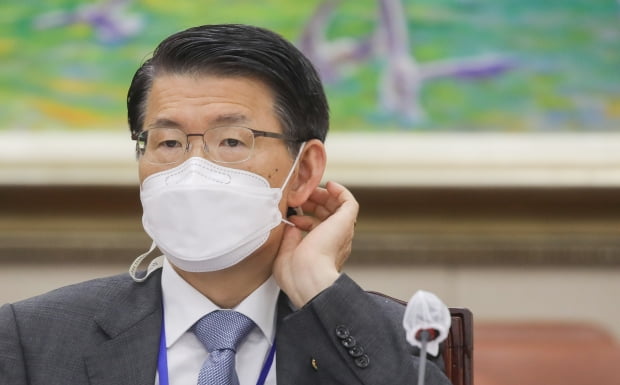
Photo = News 1
The financial authorities showed a step back in relation to short selling, which will resume in March. As individual investors and politicians continued backlash over the resumption of short selling, it showed a reserved appearance that nothing was decided.
Finance Commissioner Eun Seong-soo said in the’Financial Commission’s 2021 Government Affairs Report’ held on the 18th, “We expect to decide whether to resume short selling in February, but it has not been confirmed.”
“The matters related to short selling have been decided at a meeting of the Financial Services Commission consisting of 9 members, and it is a matter to be decided in the future,” he said. “Please understand that the FSC staff, including myself, cannot speak to this problem without worry.”
The Financial Services Commission announced that it is pursuing system improvement with the aim of resuming short selling in March. However, as the ruling Democratic Party and Prime Minister Chung Sye-gyun showed a negative position on short selling, a subtle change in attitude is read.
Short selling is a transaction in which stocks are borrowed and sold when stock prices are expected to fall. Although it is a legal transaction, there are many criticisms that institutions and foreigners use it as a means of controlling the market price. It is for the same reason that individuals complain of damage caused by short selling and request abolition.
In a situation where the domestic stock market is showing an upward trend, such as the KOSPI crossing the 3000 line, the resumption of short selling could act as a cold water in the stock market. This means that the financial authorities may say’the stock market has been pulled down’.

There are also voices from individual investors calling for a ban on short selling. More than 150,000 people have agreed to the request for a ban on short selling in the Blue House National Petition.
However, there are concerns that if the ban on short selling continues, the stock market may decline due to the withdrawal of foreign funds. Even in the aftermath of the novel coronavirus infection (Corona 19), major countries such as the United States, United Kingdom, Germany and Japan did not ban short selling, while France, Italy, Spain, Taiwan, and Malaysia, which temporarily banned, have resumed short selling.
Some argue that short selling should be resumed as the likelihood of a stock price decline is low in light of past experiences of short selling. In fact, there was no decline in stock prices in 2008 and 2011 when the short selling ban was lifted. In June 2009, the KOSPI rose from 1415 to 1600 in three months. In November 2011, he jumped from 1810 to the 2000 line in February of the following year. This is thanks to the continued buying trend of foreign investors.
Yoon Jin-woo, reporter at Hankyung.com [email protected]
Ⓒ Hankyung.com prohibits unauthorized reproduction and redistribution
